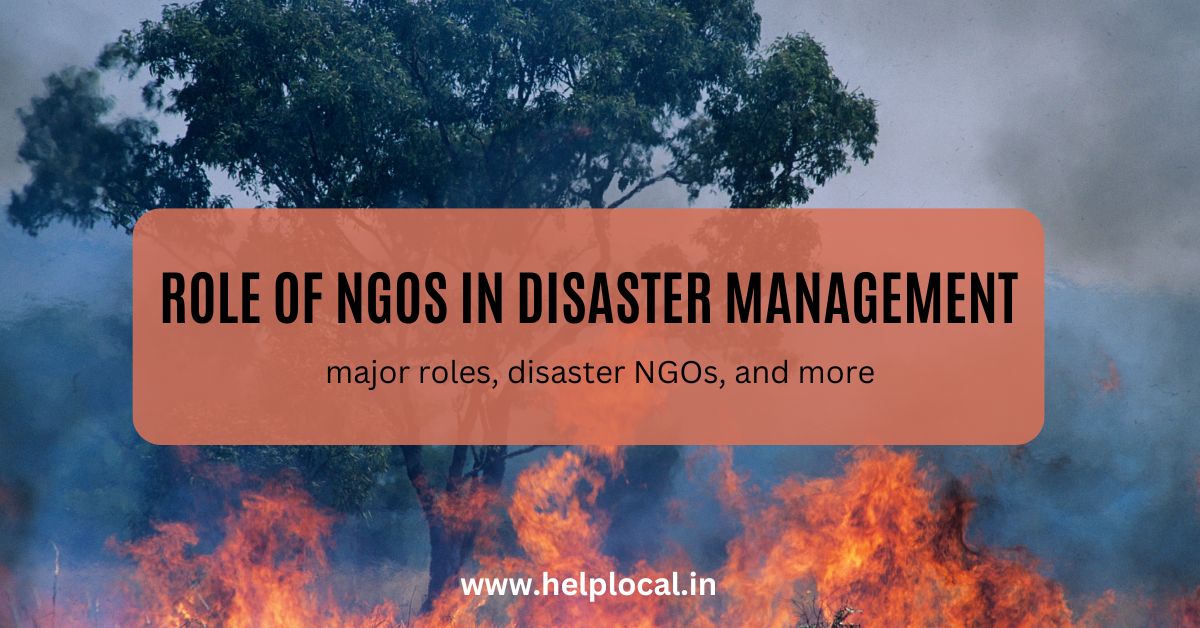India, a country prone to various natural disasters such as floods, cyclones, earthquakes, and droughts, has witnessed the devastating impact of these calamities many times. Some recent natural disasters that ravaged India are Kerala floods, Kashmir floods, Gujarat earthquake, and Uttarakhand floods. In times of crisis, the role of NGOs in disaster management becomes paramount.
Nonprofit organizations play a crucial role in complementing government efforts, offering immediate relief, and contributing to long-term recovery and resilience. However, many people aren’t sure what NGOs do when disasters – either man made or nature driven – strike. In this blog, Helplocal – the best place to search for local NGOs in India – will help you understand the roles played by NGOs in disaster management, relief, and recovery.
Role of NGOs in Disaster Management
NGOs are really important in helping communities get ready for and respond to disasters. Here’s a quick look at what they do and how they are helping people not only in India but across the globe:
Delivery of relief: Most NGOs active in the field of disaster relief and management play a crucial role in delivering relief supplies to affected people. While registered NGOs work closely with government bodies, independent ones gather food, supplies, and medical kits to distribute on their own.
Access to resources: A lot of disaster relief NGOs ensure that affected communities have equitable access to necessary resources like emergency kits, evacuation plans, and communication tools. They work with local authorities and organizations to keep track of distribution and identify regions that haven’t been penetrated with relief material.
Crisis communications: Disaster relief NGOs in India have developed robust communication strategies for accurate information during emergencies or disaster situations. These channels include phone numbers, social media profiles, and local representatives. During natural disasters, NGOs play a crucial role in keeping these communication channels open so that people in emergency need can connect.
Training and skill development: Disaster management work often begins when disaster is far away. NGOs run training programs to equip community members with essential skills such as first aid, disaster preparedness, CPR, and basic techniques. This not only increases individual reliance but also creates a culture of collective support. This is a very important role played by disaster management NGOs.
Infrastructure improvement: After the disaster, infrastructure improvement is one of the critical goals of NGOs helping locals with recovery. NGO volunteers help people in rebuilding homes, toilets, shelters, and water supplies. Once the initial relief work is done, they work with local leaders and governments to implement better monitoring systems and processes.
Education and awareness: Educating communities about the risks and hazards they face, whether natural disasters, health emergencies, or social cries is also the role of disaster management NGOs. Empowering individuals with knowledge about how to prepare and respond actively is important for long term resilience in disaster prone regions that frequently see similar challenges.
Long term preventive work: Even during times of peace, NGOs working in the field of disaster management work to promote policies and procedures that focus on reducing disaster risk and empowering communities by collaborating with government, and international organizations.
Other responsibilities of NGOs: NGOs perform so many tasks to save lives and minimize disaster impact that it can be hard to summarize it all. Here are some other roles played by NGOs working in the field of disaster relief and repairs:
- They help communities and regions share the best practices learnt from each other’s experiences and adjust successful strategies to fit their specific needs.
- NGOs conduct surveys and tests to see how successful their disaster management programs are. This feedback helps them come up with better and safer plans.
- NGOs work to make sure that everyone has a fair shot at dealing with disaster. Be it children, seniors, or people with disabilities, they make sure that everyone has sufficient access to resources and information.
People who work with disaster relief NGOs are active in regions where natural disasters such as floods, climate change, and earthquakes are common. Because of routine disasters, people live in vulnerable conditions and suffer the most physically, financially, and psychologically. That’s why the role of NGOs is very important.
Recommended reading:
Discover water NGOs in India
How to help the poor in India
How to start an NGO in India
Leading Disaster Management NGOs of India
India is home to hundreds of NGOs that work in the field of disaster relief and recovery. Here are the most popular names:
- Educare NGO, Dharamshala
- The resilient foundation, palghar
- Goonj , PAN India
- MANPC Society, Lucknow
- Rapid Response
- Smile foundation
- Hindrise
- Help Age India
Volunteer with disaster management NGOs: Endnote
We hope that the above blog helped you learn everything about the role of disaster management NGOs in India and also abroad. We have covered most of the important details about the role of NGOs in disaster management but these are not the only things they do. They do a lot more to help people and save lives.
Disaster, regardless of being natural or man-made can occur at any time and can have devastating effects. Thousands of unsung heroes are working tirelessly to make things better for the affected communities. If you want to help, we recommend working with your nearest disaster recovery NGO. By joining hands with them, you can make a real difference.
Want to empower small local NGOs and community groups? Check out these pages:


